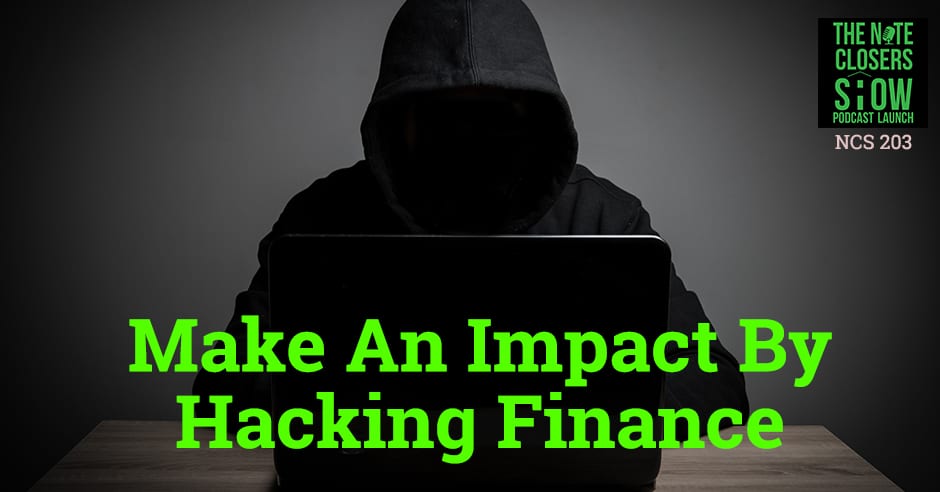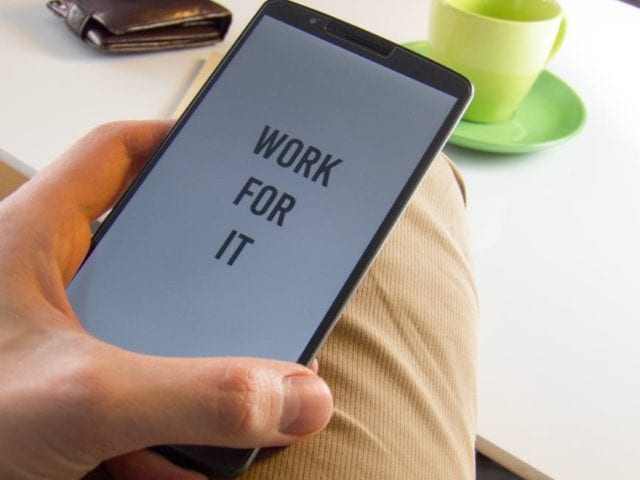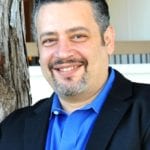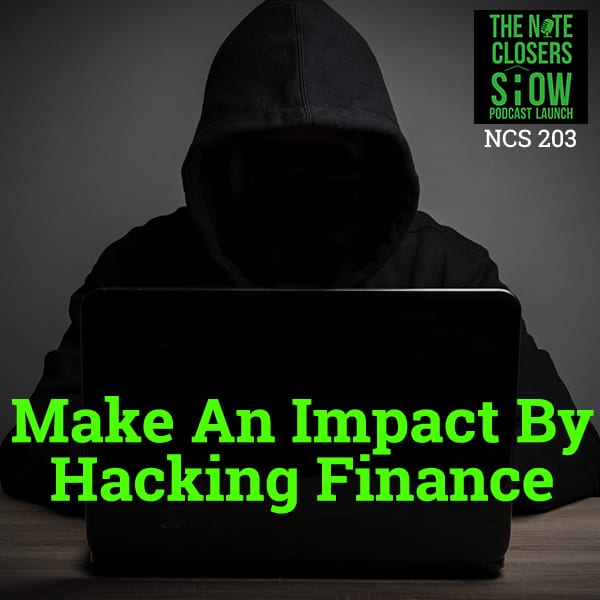
Commit a few years of learning the trade to be a master of the investing world. Financial nerd George Antone believes that by thinking like a banker, you can use banking techniques to make your business grow. Learn why one good way of hacking fynanc is having a small team which will translate to a smaller overhead which giving way to less stressful days and making more money.
—
Listen to the podcast here
Make An Impact By Hacking Finance With George Antone
We have a very special guest, my good buddy, George Antone. If you don’t know who George is, you better Google it really fast to find out because this cat is the author of several bestselling books. He has three or four bestselling books. He also created the largest network of private investors across the country. What he’s probably best known for right now, if you’re in a real estate community, is the book, The Banker’s Code and The Banker’s Code Revisited. He is doing something amazing now, switching gears, tweaking businesses like we often do, and literally spending his time learning how to hack different finance rules or rules of engagement that a lot of people don’t know about.
George, thank you. Thanks for joining us.
It’s my pleasure. It’s my honor. It’s always, always great spending time with you and chatting. I think you and I can chat for literally hours and hours and hours. It’s always fun.
It was great catching up with you in Cincinnati at the Ohio REIA that Vena Jones-Cox put on, a great event. Hanging out with you, John Burley, Damon Remy and a few of the other characters out there, Larry Goins. I would say the same thing. George, you and I could sit here and just visit and pick each other’s brain and talk about stuff. What I love is we realized that we have a lot of the same characteristics. We both have big hearts, want to give a lot of information to help people, and a lot of crossover with a lot of students that are out there and doing things, whether it’s buying notes or raising capital or engaging rules of finance to help them really raise more capital or retire earlier and make more money, right?
Absolutely. All I hear are amazing things about you. It’s always a better training but it’s always back and forth.
I wanted to have you on here because you do such a great job of providing value. Why don’t you share a little bit some of the things that you’re working on right now, with only a month left in 2017 and then 2018 around the corner?

Hacking Finance: Investing, you have to be committed to it for a number of years to really master it.
I’ve been training for a number of years now, more than ten years. One thing I found consistently is certain people sitting in my audience that just don’t want to spend the time to learn to invest. That’s fine. What I found though is that there are so many people out there. As you know, investing, you have to be committed to it for a number of years to really master it. Even though you can start relatively soon, but you have to spend and invest the time. I found a lot of people that just want to enjoy life and their whole question is, “What are the few things I can do to leap forward financially without having to spend all this time learning to invest?”
I heard that way too many times and then this one time, this one lady walked up to me at an event I was invited to speak at, and she asked me the weirdest question. She said, “How can you build financial security without investing in stocks, mutual funds, real estates, all that stuff, without trading, without selling anything?” I jokingly said, “Marry a rich person.” She said, “Not that too,” and she doesn’t want to start a business. Honestly, I was dumbfounded. I started looking into it and then I found this whole idea of what I call hack finance. You can hack finance. You can do these small tweaks a few hours a month. Not really a week but a month and tweak a few things and then just sit back and let it work for you. It has such a huge impact on most people’s finances.
That has been so intriguing to me and so fascinating. I’m the biggest nerd and I love tweaking with those things. Even though I love investing myself, it doesn’t mean it’s for everyone. That’s where I spend a lot of time. I have a lot of extremely smart people I have access to. We call ourselves financial nerds. In a few weeks, I have a whole bunch of them coming to my office and all we’re going to do is nerd out on finance.
I love the whole idea of the nerds aspect of it being a finance nerd because we like to call ourselves note nerds over here. That’s one of the things that you and I both have such in common is our brains are always tweaking things or how to adjust things. I spend a lot of time on Excel spreadsheets working on payment scenarios and workout strategies and things like that. You said several good things. I think one of the biggest things that I see that you struggle with, I struggle with is how few people actually take action to accomplish anything. Would you agree with that? I would say it’s probably 10% or less of people who actually will take time to do some things. It’s not necessarily, they may be working too much or they may be chasing too many squirrels to be able to identify one. Would you agree with that?
One of the problems I’m trying to solve is exactly that. You have incredible information out there, but again because people are just not cut out to wanting to do certain things and they’re looking for something much simpler. They might not build as much wealth. As long as we give them some guidance on, “Here are some tweaks you can do,” it will have this huge impact. If they choose or when they choose to start investing, whatever I talk about really enhances their returns, their yields. You’re absolutely right. The biggest issue out there is so few people out there follow the methods being shared and it drives me nuts and I know it drives you nuts.
It drives an educator nuts because that’s the frustrating thing. If you’re teaching something, it’s usually because you’ve put the things in place first. You’re walking along not just talking the talk on some things like that. It’s always frustrating. Especially in our neck of the woods, it seems a lot of people have closed on two or three deals now to become educators because they’re not following what they should do.
Especially as we dive into the New Year, everybody is worried about New Year’s resolutions or what a failure this year was because I didn’t get to do what I needed to do. The true definition of insanity is doing the same thing over and over and over again and expecting different results. What are a couple of pointers that you would give people out there to have a more successful New Year’s when they come to the goal planning? I’m not talking about resolutions, because I’m not a big believer in waiting until the New Year to start. I think everybody can start today, no matter what that day is. What are a couple of suggestions you would give people in looking at trying to get more successful now? Let’s start with just general and then one in finance.
I’m a big believer right now of start doing something now. One of the things I did, and I’ll give you an example for it, we just finished Thanksgiving, so during the weekend what I started doing was getting rid of my VHS tapes. As a family, we got together we were trying to do something fun. We’re copying all these VHS to digital files. The more stuff we can get rid of, the better you feel and now you’re moving, you have movement going on. The sooner you start doing something small, it has an incredible impact on keeping things moving. Just start something small. For us, it was getting rid of all the cassette tapes. I literally just threw them out. I signed up for Apple Music and I felt so good just getting rid of clutter. We’re doing that with CDs next. That’s the first thing I would say. Just start something small and just have movement and you’ll feel really good about it.
It’s like the Marines’ idea of making your bed first thing in the morning. Have a success first thing on something, you’ve achieved something and then you move on to something bigger. A lot of people are doing the whole purge thing right now, especially pulling out Christmas decorations, going up in the attic and they’re like the Chevy Chase in National Lampoons opening up boxes of stuff. It’s good to see that you’re actually living on the 21st Century.

Hacking Finance: One of the biggest things that I can tell you, in 2010, when I sold everything in Austin and I started traveling for three years, it was a little depressing selling everything off.
Moving forward, one little small thing whether it’s purging, getting stuff out of the way. Some people say I need to clean my office to purge but I’m like, “It’s in controlled chaos here.” It’s the same thing as if you don’t use something in six months, get rid of it. One of the biggest things that I can tell you, in 2010, when I sold everything in Austin and I started traveling for three years, it was a little depressing selling everything off. Within six months of me traveling, it was very liberating because I didn’t have all the stuff tying me down or pulling me down to a place. The best analogy I’ve ever seen of this is, have you ever watched Up in the Air, the movie with George Clooney and Anna Kendrick?
No.
You would love this because it’s a guy who’s a salesman for an insurance agency or something, out in Nebraska, who spends most of his time traveling the country. It’s a professional job layoffer. He goes up to companies and lays people off. He’s all about the points, all about traveling. He speaks part-time about a backpack. Think of all the things you own and put it in the backpack. How heavy is that going to be? How heavy is that couch or that mortgage payment or things like that? If you can slice away a lot of the dead wood that we all have, we got things that we’re probably being charged for each month that we don’t use anymore. God knows I have little technology things like that I have to clear up every six months. Files or properties or whatever it is, get rid of it and you’ll feel a lot happier. I got a buddy of mine who’s got some note deals that he’s just getting rid of. He’s just like, “This is not worth my time. I’m going to sell it and breakeven, even lose a little bit of money.” It’s peace of mind at that point.
You were saying something that I’m such a huge advocate of, which is you have to put a value to peace of mind. A lot of people look at numbers and numbers are really important and we both like to look at numbers. However, you also have to put a value to peace of mind and then you have to compare them. Let’s just say something is yielding 10% but is having so much stress on your financial stress or some other stress on your mind, ask yourself what’s peace of mind. To me, peace of mind is significantly more than 10%. I would get rid of that to have peace of mind. You have to put value to peace of mind. It’s very, very, very important.
Being able to sleep at night goes a long way.
They call it the pillow effect. Can you put your head on the pillow and sleep well? That’s so critical.
It’s totally used to that, especially when you’re teaching a lot and travelling like you and me. What are some goals or things that you’ve got planned for the New Year for you?
I’m all about impact and giving back to the community. I’m always looking for different ideas to have a positive impact. I’ve already done some amazing things this year and I’m working on some really new things that I’m going to keep secret for now for this coming year. They’re all to do with impacting not just my community but nationwide, helping certain students have bigger impact, a lot of things to do with veterans and things like this. I’m so passionate about this because at the end of the day to me, significance is the ultimate thing, is being able to give back, change lives, all that stuff. To me, that’s what drives me. I’m looking at certain projects to focus on within that. How about you?
I’ve got a lot of that stuff. We get a big kick out of the lives that we change and in helping people. I got an email from my friend, Gail Greenberg, who is an investor out of Philadelphia. One of her biggest goals is to get to $10,000 a month in cashflow to cover her bills and to live what she wants to live. She’s got to this point in the last year, she’s at $7,000 a month, which is great, just off of recurring mortgage payments. She’s 70% of the way to her goal, which she thought would take longer than two years. She’ll hit that probably by the middle of the year. She’s always wanted to be a big advocate into helping out, donating money, donating to causes.
I’ve always been a proponent of you don’t have to necessarily wait until then. You can start putting 10% of what your profits are, tithing. It’s like paying yourself first, which you and I both believe in is the important thing. Putting money away but also going and building that into your structure. We’re obviously a big advocate for the military, past and present.
You said something so powerful and I want to really expand on that. I know we’re talking about different things here. What I tell people more important than actually giving money is enrolling people into a bigger vision. Even if you give $1,000, $500, all that’s good. What I want to encourage people to do is learn how enroll people into something bigger and get them involved. I was watching 60 Minutes. Did you watch the 60 Minutes about the gentleman that owns 30 restaurants?
Yes, he gave 40,000 meals over Thanksgiving weekend, something like that, which is amazing.

Hacking Finance: Giving is great. Enrolling something into a bigger vision is so much bigger. You just have to learn how to do that.
So far, they’ve served three million meals. To me, here’s what’s interesting about the whole story. He went there, he didn’t know what was going on. He just went there because he felt he had to go there. The biggest lesson, if you watch it, is he enrolled the locals into a bigger vision because he said, “I got there, everyone kept saying there’s no food, there’s no food, there’s no food, there’s no food.” It turns out they had the chefs, they had the kitchen, they had the food, they had the different ingredients, everything was there. They just didn’t have the conductor. He sold them on the vision of, “Let’s actually all get together.” He found the kitchen, got everyone. If you notice in the video clips, he’s just walking around, singing and he’s actually enrolled them into a possibility. To me, that’s one of the things I love to do with my students is tell them, “Giving is great. Enrolling something into a bigger vision is so much bigger. You just have to learn how to do that.” My inner circle is not just investing, but enrolling people in the community into something bigger and a bigger possibility. Some of the stories I’m hearing and we’re seeing are incredible, incredible, incredible.
That’s what it’s all about. It’s not just about what we can do but if you can inspire people to do other things or come together. I think a lot of people, they get shortsighted, “I can only do this.” If you put a lot of shortsighted people together, it becomes a bigger vision. Sometimes people just need somebody to come in and be a manager or see where the disconnect is, and putting those people together to make things happen. It’s amazing just two people together can do so much more than two people individually.
Part of the reason I wanted to do the hacking finance is because I really wanted them to focus less financially. They know that they’re building wealth. They don’t have to worry about that and they can focus on significance and impact and all that. To me, I’m seeing more and more of that now and they’re spending less time having to worry about day-to-day finances. My promise to them is allocate six hours per month and as little as 30-minute increments for your finances. That’s it. Per month, not per week. I’ll show you what to do, just focus on impact. It’s been going incredible.
For those that don’t know, George, you’ve transitioned more from the capital raising to these finance hacks over the last year. First time I heard you talk about it, I can just feel the passion coming out of your pores. You were so excited like a kid in a candy store or a kid at Christmas trying to describe what they got and he’s bouncing back and forth. Being an ex-banker and financial advisor, I loved it because I was like, “You’re totally right. Here’s a little thing about swift accounts and moving some things around.” It takes literally ten minutes a month or 30 minutes a month. It’s so impactful when you do it because you’re using the banks and other institutional rules that they don’t get paid to promote but there are things that those professionals are going to have happen to them that makes hundreds of thousands of dollars difference over the long run to your bottom line by just tweaking a few little things, right?
Yeah. In fact, a lady contacted me recently who was very skeptical about following what I was teaching. She said in less than 24 months, she’s made 50,000 without much work, so just with a few tweaks. $50,000, free, incredible if you think about it. It’s a very different way of thinking. It’s not a simple way of thinking about it. One of the biggest issues that I find with a lot of personal finance people is they say, “Put this much money every month and after a gazillion years, you’re going to have this much money.” They haven’t considered inflation, they haven’t considered taxes, it’s all on paper it works but they haven’t considered so many things about it, opportunity costs and all of that stuff. These things cost more and you can’t just disregard them. The way of thinking is so different. That’s the challenge I find is once they get over the way of thinking, these are simple to implement but you have to think like a banker. You’re using the banker’s strategies against them and against the financial system. I’m like this little kid in the candy store hacking different finances here.
I think a lot of it goes into the fact too that as smart as we are and as wealthy as the United States is, we’re one of the least financially educated societies out there as much as we have available. It starts in the high schools, the junior highs and things like that. The first time I saw the Rule of 72 and utilizing that and then adding in, “What’s my growth? What’s inflation?” figuring your tax bracket.” It’s not as simple you’re 2% and then you retire in 40 years aspect of things. There are a lot of things you can do now with little to no funds to get things rocking and rolling and get to a much better place down the road. I love what you’re doing too because you’re only doing a thing where you’re up to 1,000 people. You’re working with 1,000 dedicated people to really focus on something. You almost got to that point now in the last eight months, nine months of adding people to it?
Yeah. What happened is a lot of people just started sharing it with their friends and family and next thing you know, we’re close just under 1,000 members now, what we call charter members. They’re crushing it and the results have been incredible. We have a lot of those tweaks. The ones I’m talking about, six hours or less per month, that’s how long it is to implement one tweak at a time. People have implemented two or three and have only seen significant results and we have tons and tons and tons of them. They’re like, “This is real.” In fact, one person said in his first two weeks, he implemented one strategy and it’s already paid up way more than the investment for the membership and they’re like, “This is incredible.”

Hacking Finance: We come from a very skeptical perspective, so it’s really important for people to understand the numbers.
Everything is based on spreadsheets and math. I am such a skeptical person, when someone makes a claim on, “You can make all this money,” “Let me see the spreadsheets.” That’s one thing that you and I have in common is we like to show the spreadsheets so people see it’s real. We come from a very skeptical perspective, so it’s really important for people to understand the numbers. That’s fascinating to see that.
The book you sent me not too long ago, Profit First, I have to say thank you to. One of the best books that I have read in the last couple of years. It’s so valuable. We do a book club and we’ll have the first review, which our first book is How to Set-Up Your Business for Under $1000 by my buddy, Dan Fleyshman who’s a professional poker player. It’s an easy book to read but it’s so valuable. We’re actually going to make this the second book to discuss about because I think it’s so valuable as entrepreneurs who read this stuff and identify those things. If you can take this into consideration along with financing hacks, it sets yourself up to make things really skyrocket and go far.
I want to say something about that book. It’s really helped me so much. In fact, I sent it to a whole bunch of people that are close to me and they’re all raving about it. It simplifies your accounting. One of the biggest problems with business owners is managing their accounting. As entrepreneurs, we have so much more to worry about and this simplifies things so much. In fact, it’s increased my margin significantly in my business. It’s simplified my life. It’s simplified everything up here when it comes to accounting. It’s a great book, Profit First. Make sure you get the second edition.
I like to buy books at Half Price Books because that way, if I buy them and I just read them, then I give a lot of them away. This one, I’m going to get it brand new for somebody to hold on to it because I’m a big fan of it. The author is Mike Michalowicz for Profit First.
A very, very funny guy.
He makes it a very enjoyable read versus something that’s very boring. When you talk about accounting, a lot of entrepreneurs, they just close. I will tell you, I agree with that aspect. Accounting is often the last thing you want to spend time diving into as entrepreneurs. If you’ve ever read The E-Myth, we’re having to juggle three things most of the time and accounting falls in that one thing of having to go back and reconcile everything in customer service and stuff like that. I don’t know if you’ve ever met my buddy, Aaron Young with Laughlin Associates.
I’ve never met him.
Aaron actually does a lot of talking about accounting and the things that they do with their books and stuff like that. I love him so much I sent him the book. He’s an advocate of you and he doesn’t even know you yet. George, you’ve done quite a bit of different real estate stuff. Why don’t you talk a little bit about some of your background in real estate and investing in that stuff as well?
I used to be in Hi-Tech. In 2001, I decided to walk away from an incredible career in Hi-Tech. I really wanted to have the lifestyle that I wanted to have. In 2001, I started getting into investing. I invested in first single-family homes then apartment buildings. I did a lot of apartment buildings. I started running a small fund for private money lending. I did a lot of private money lending. I’ve raised millions and millions of dollars for different ventures, not just real estate but outside of real estate as well. I funded businesses and I still do that. I love raising money. I’ve done so many different things from commercial real estate, single-family homes, lending, I’ve also bought some notes. I used to buy non-performing seconds and I would contact the first, and you all know that by now with Scott’s training. The whole business of real estate is fascinating. That’s what my background is.
Now, I’m realizing that not everyone wants to buy 100 single-family homes or 100 properties or whatever it is. That’s why I’m going into how do you tweak your finances so that you have the maximum impact on your wealth without a lot of the stress and without having to invest so many years in mastering this. It’s a whole new paradigm of building wealth that I’m fascinated in. I normally tell people, when it comes to investing and building wealth, there are three main buckets, if you will, other than entrepreneurship: investing, trading and what’s out there is living very frugally. The three main buckets that people associate with. Everything fits in one of those three buckets.
Every single one of them is a commitment for life because you have to learn so much. What I’m talking about is a new bucket here, a whole new paradigm on hacking finance. It turns out that it’s something that you can do relatively quick. It’s low risk and it enhances any other investing you might be doing. It actually fits so well with note investing, because I’m a huge advocate of note investing. That’s my background.
You’ve definitely have shaped a lot of people over the last few years with raising capital and funds and people use that money for mezzanine financing or firsts or seconds and things like that. It’s amazing. That’s why we get along. We have a lot of the same philosophies and things like that and crossover students to doing some things. I love where we’ve gone. We’ve been all over the place, which is good. We talked about hacking finance. We talked about goals for the year. We talked about a great book, Profit First. What’s your goal? What’s your ultimate thing that drives you on a daily basis?
Three words: Cracking the code. Here’s what I mean by that. Have you seen the movie, The Matrix?
Yeah.
I know mathematically speaking, we live in a financial matrix and I’m always looking at how do we crack the code for people and helping them. One of the things I do for fun is I hang out with a lot of nerds like myself and we try to figure out new things. These are people that have been associated with top 15 companies in the world and there have been finance people, directors, CFOs. That’s what we talk about for fun, “How do we go about cracking?” We’re always talking about really fascinating things. The reason I do that is because I know that if everyone lives in the mindset of impacting the communities and impacting the world, and they don’t have to worry about their finances because their finances are tweaked in the right way, they can do so much more in life. Finances themselves don’t make you happy necessarily, but being able to be of significance and impacting is so much more fun when you don’t have to worry about your finances. I choose to help solve that problem of the financing bit because I want people to step into their greatness. That’s what really keeps me going every day. That’s my thing. How about you, Scott?

Hacking Finance: I choose to help solve that problem of the financing bit because I want people to step into their greatness.
I love cashflow. I’m not going to lie about that. I love the idea of being able to do what I want to do and helping people do that. If anybody was going to work in a job that they hated, I think that was my biggest driving factor is trying to help people free themselves. My dad was an entrepreneur and struggled as an entrepreneur. He did things that he wanted to do, which is great, so I have that driving factor. It keeps me up raising up a real family. Dad owned a local hardware store for about fifteen, twenty years and built something out of really nothing. His health failed as he got older with diabetes and stuff like that. Those are the two biggest things that drive me.
Especially right now, I’m 40. I was born when my dad turned 40 and then my dad was diagnosed with diabetes at 48. My mom says I’m a splitting image of my father, my hands, my feet, my legs and things like that, hereditary stuff. It’s a big thing seeing the health problems that my father had later in life because he didn’t really take care of himself because he was a workaholic. That’s the big thing that rides on me right now because I’m wanting to get back down. God made me special but to the point where I want to get my health back good and then also helping people overcome and get out of the jobs that they hate. If you’ve ever worked in a job that you hated or had a boss you hated or you hated getting up in the morning, driving to somebody else’s dream is not what I ever intended for myself. That’s one of the biggest things that I strive for on a daily basis. I get up, come into the office, let’s see who we can help today, who can we help hack finances or hack the job or hack their lifestyles so that they can do what they want.
You and I, we do a lot of fun, cool things in our travels and going places and speaking, and seeing so many individual people on a one-on-one basis as when we’re out talking and seeing lives get changed. We know it’s possible to do it. Our people will take the simple steps really, when they let go of that railing that a lot of people hold on to, scared. That’s my biggest goal is say, “Let’s help people step away from that railing and let go. You’re not going to fall on your face.” It’s impossible to fall on your face and take a backward step.
I love that freedom to summarize everything you just said. I love that it’s so powerful and I can totally relate to that. Freedom is much more important than being rich. Having the cashflow gives you the freedom because then you don’t have to worry about a job, you don’t have to worry about your finances. There’s something that happens once you get to that point. I tell people, “Every cell in your body reprograms somehow and suddenly, you see some amazing possibilities. It’s so hard to see them when you don’t have that freedom.” Being free, of a job and finances is so powerful because of that. The possibilities are endless.
I see them a lot in students and people out there that I’ve met them when they were working at a job. Then when they’re able to leave their job and do what they want to do, it’s just an overwhelming brightness. Their whole disposition changes. We got a buddy, Dave Cass, Surf City Investments, does a lot of firsts, does also a bunch of seconds. He’s a financial analyst and other things. There’s just this negative energy when he’d come into a room or sit down and listen. His eyes look gruff. He left his job I think two years ago now. Every time I see him, he is just like bouncing around. He’s smiling and healthier and loving life and enjoying doing what he wants. He was just celebrating the one-year birthday of his daughter just recently. It’s great to see that stuff with people. That’s what gets me so excited. Those are the things that I get more joy about. We love celebrating those victories for people, students that are closing their first deal. I’m not one of these guys and I know you’re the same thing, “You didn’t do it exactly for me? I don’t know what you’re talking about.” No, you did something great. You took initiative to make things happen.
Let’s take it a different way. Any troubles, any things you’ve tripped up on, stubbed your toe on, banged your shoe against the wall in business in the last few years that has troubled you but you’ve overcome it to be a stronger individual?
I’ll tell you a huge lesson for me and not just for me, it doesn’t apply to maybe a lot of people. What happened over a few years, our company was growing so much and our overhead was also growing. We got to a point where we were generating so much revenue but our overhead also was pretty high. The stress level went up. I noticed that in this year, I lowered our overhead significantly. I’ll just give you some numbers: $360,000 a month down to $50,000 a month. We had to change a lot of things but we’re more comfortable. We’re all happier. We don’t have the stress. The beginning of every month, we would look at this mountain of overhead and we were like, “We have to crack that number every month.” Now it’s like, “I don’t care,” there are so much reserves, we’re in such a better place and we’re just happier.

Hacking Finance: We had to change a lot of things but we’re more comfortable. We’re all happier. We don’t have the stress.
One of the things that occurred to me is that, as entrepreneurs, we’re always thinking, “We want to grow the business, we want to grow the business, we want to grow the business.” Screw that. I am so much happier, a smaller team and less overhead. I realized that the overhead has a lot to do with your happiness, which is really crazy. If the intention is to sell the business in the future, that’s a different thing. I love what I do. I don’t want to sell ever. I just love what I do.
We’re making more money than ever before. We’re more profitable than even before. Even when we were generating eight figures, so what? Now we’re generating seven figures per year and I’m happier than ever and I don’t have to worry about overheads. I don’t have to worry about any of this stuff. We have very little overhead. To me, the biggest lesson was this whole idea of building a huge business that’s generating $20 million, $30 million, $40 million, it comes with stress. That’s been the biggest, biggest lesson for me. I see the world of entrepreneurship very differently now with this lesson.
That’s a huge lesson I think a lot of people think is, “I got to do more,” and more is not always best. More is not always more. A coach of mine, a mentor of mine earlier on told me to avoid the big high-rise offices with the huge rents. Just because you can afford it doesn’t mean you need it. When you have a huge overhead and huge staff, you become a huge babysitter a lot of the time and you’re not able to focus on things. A lot of times, you have that big revenue but then you’ve got to have a big overhead and it doesn’t always equate to profitability. I totally agree with that. I’ve been through that myself over the years.
I think partners is the thing. I know you’ve had partners on and I think you’re happier now being your own guy to knock things out and control things. I’ve done that. We’ll partner up with that person that will be just as passionate as I am, and that’s not the case 99% of the time. Right, George?
100%. That is a big, big lesson. You can joint venture with people but not necessarily be partners in the same business. Joint venturing I think is actually a lot of fun. You get to support each other, but they’re separate businesses. There’s a big difference between joint ventures for people out there and being partners in the same business. That’s been a big lesson for me, Scott, which is reconsider having a partner and think of joint ventures more than partners.
I would agree with that because a joint venture is easy to be in and out of. Partnerships is a lot more mess. A lot of people partner up initially because they don’t feel like they’re strong at one thing, “I’m going to partner up with somebody who’s strong at that one thing that I’m weak at.” You don’t have to do that. There are plenty of vendors out there that can help provide that short-term fix to help you get that over the help thing or whether it’s marketing or accounting or sales, things like that. There are lot of great vendors out there to help provide things. We’ve had those conversations, who do you use for that and vice versa, going back and forth to help get things done. One of the things that I love that you’re doing too in the last year and I’m very proud of what you’ve done is you’re doing more of the online stuff and less of the travel stuff too. Big change for you.
Thanks to you. I want to expand on that. We get stuck in our comfort zone. The comfort zone is whatever is in here. To step out of that comfort zone is always challenging, especially for an entrepreneur because you have things working. One of the things that really I’m always looking for is how do I grow and who has done it so I can really leverage off of their experience. Scott, you have been a huge influence in helping me move out of that comfort zone of doing things offline and moving online. It has done so much for me, thanks to you. I really appreciate you for that.
I want to just share this story really quick. In November of 2016, I was sitting in my office with someone and I drew a big circle that says, “This is old company. This is where I am right now. What do I want my life to look like?” I started with this crazy idea of here’s what I want in a perfect world. You had so much to do with it. A lot of the strategies I’m learning now of simplifying my life as an entrepreneur came straight from you. Thank you for that. Really, not just the strategy but also the inspiration. It took me four, five months of making very, very, very, very hard decisions. That’s the bridge between where I was to where I am today, was called hard decisions. That’s what it was. I had to make hard decisions and I surrounded myself with the right people. In this case, you and a number of people, and they helped me cross that bridge, so I am today where I am. I’m very happy because of people like you.
I could say the same thing with you, George. I’ve learned a lot from you over the last couple of years, and applied strategies and it’s helped out tremendously. A lot of people don’t realize that the most successful people are the most approachable, the most giving of success, whether it’s you and me back and forth because we’re friends. We want people to succeed. We don’t want people to make the same mistakes that we’ve made. I’ve talked to several speakers and they’re like, “We’ve got to do something different than what we’re doing.” I think we get stuck in that rut of doing businesses normal versus doing something new. I call it the philosophy of unfinished bridges. We’re here where we’re at, we want to get over here and there’s this chasm in between. The unknowing of what it’s going to take to get to there is what scares us. A lot of times, we’ll start something, get halfway through and not finish it, and go back and start something over because we don’t see it completely.

Hacking Finance: If you can complete one thing and get it done, it becomes that much easier to go back and forth and it’s a business system now, it’s working.
If you can complete one thing and get it done, it becomes that much easier to go back and forth and it’s a business system now, it’s working. You’re doing that a lot with this technology you’re using out with Zoom. You were talking about that and how you’ve gotten better at it and we get better at it every time we do something with it. It’s just the consistency of doing things in a regular basis. You may be a little nervous, but I’m glad that you shared that because everybody deals with that. We’re not experts in everything we touch immediately. We all struggle with implementing things or going back and making sure everything is working properly or dealing with overhead or dealing with employee or dealing with other things, it’s a normal facet of life. Once you realize that everybody struggles with it, you have much more rewarding conversations versus trying to hide something.
I can’t stress this enough, surrounding yourself with the right people that are doing the things you want to do. Going back to the Zoom, you and I had breakfast together in Ohio and you told me, “George, get your ass to using Zoom.” These were almost your exact words. I literally spent so much time on YouTube learning how to use Zoom. That’s just one of many examples. You’re so right, you have to push yourself out of your comfort zone. Thank God for things like YouTube and the help of the right people, you can do some amazing stuff.
Not have a slip up on anything. I’m a numbers guy like you. I track opt-ins, I track cost per leads. I know we talked about that for hours in Cincinnati about stuff like that. I look back at what we’ve done with these webinars and a lot of people told us initially, “This is not going to work. It’s going to fail because it’s not going to work. It’s not the same way of doing business. We’ve done it like this for years.” I look back last night on my numbers and we had 200 people that were RSVP-ed for the webinar, which is great. Initially, in the hour and a half, we got 270 people literally watching the webinar or joining via Facebook. When I looked this morning right before I logged on to Zoom, we had over 400 people that watched that, which is crazy. That’s another 130 people between 9:00 at night and 9:00 this morning, in the late night hours. That’s 400 people I wouldn’t have hit if I would have done business the old way of doing things. It’s getting the word out.
I think that’s where 2018 is going for a lot of people. The bigger you can communicate and the more people you can touch, the more lives you’re going to change, obviously the more profitable you’re going to be by helping more people. A lot of people, especially on the education on the guru side, they have an inward looking model where I’ve got to control everything, I’ve got to do everything, I can’t give anything out or can’t communicate everything out because I’m going to lose control. Sometimes giving up control is the best. You never know what’s going to happen.
I know you’ve had some really great successes doing some things in just the last twelve months. I’m very proud of it. You’re looking good. You’re doing some amazing things. You’re more profitable, less stressed, having more fun, ultimately.
Fun, freedom, finances, family and faith.
George, I want to first of all say thank you so much for joining us on the show. Do you want to give me your website and the best way to get a hold of you, anything like that?
Fynanc.com. Check it out. We’re super excited about the work we’re doing there. Scott, I want to thank you for allowing me to be on this podcast. It’s always fun being with you and chatting with you. Thanks for being an amazing person.
Thanks so much for sharing. Thanks for having an open heart and open dialogue and just sharing. These are normal conversations we have all the time, just talking about what’s going on in life and sharing and how can we help fix things and literally help solve each other’s problems. It’s like we’re a good evil hero trying to help the world but with little world domination.
Once again, check out George and some of the amazing finance hacks he’s doing at Fynanc.com. George, thank you so much. Thank you for all that you do and helping. We look forward to seeing what 2018 has in store for you as well as with everybody else.
Take care. Thanks again.
We’ll see you in the next episode. Have a great day. Go out and make something happen. We’ll see you all at the top.
Important Links
- George Antone
- The Banker’s Code
- Profit First
- How to Set-Up Your Business for Under $1000
- The E-Myth
- Fynanc.com
- Laughlin Associates
- Zoom
About George Antone
 Founder of WealthClasses, a leader in wealth training seminars nationwide.
Founder of WealthClasses, a leader in wealth training seminars nationwide.
Founder of Millione Group, an investment group, responsible for launching a number of very successful companies.
Currently owns real estate investments nationwide.
Specialties: real estate investing, trust deed investing, wealth education, real estate financing, infinite banking, business startup, investment strategies

